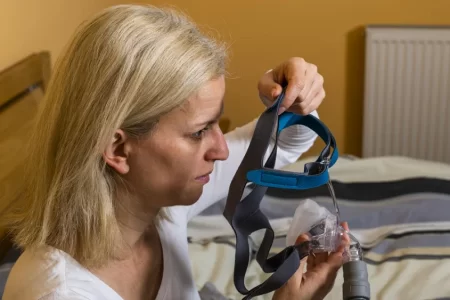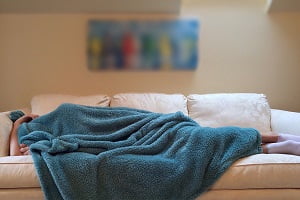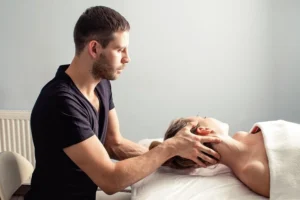Sleep Apnea in Children
- Updated on: Jul 12, 2024
- 5 min Read
- Published on Apr 2, 2020

Definition: What is Sleep Apnea?
Sleep apnea is a disorder in which breathing stops involuntarily for brief periods of time during sleep. Snoring is a characteristic feature of sleep apnea.
For persons suffering from sleep apnea, a combination of disturbed sleep and oxygen starvation (due to blockage of air passage in throat or nose) may lead to hypertension, heart disease, and mood and memory problems.
How Does Sleep Apnea Affect Children?
Sleep apnea is very common in children and is also known as pediatric sleep apnea.
According to the American Sleep Apnea Association, the age of children with sleep apnea varies, but for many of them it lies between 2 and 8 years old.
There are two types of sleep apnea in children:
Obstructive Sleep Apnea
Obstructive sleep apnea refers to the blockage in the back of the throat or nose. This condition most commonly affects children.
Central Sleep Apnea
Central sleep apnea occurs when the part of the brain which is responsible for breathing doesn’t function properly and is unable to send the breathing muscles the normal signals to breath.
The severity of snoring is different between the two types of sleep apnea. Snoring can occur with central sleep apnea and obstructive sleep apnea both but it’s much more prominent with obstructive sleep apnea as it is related to airway obstruction.
What are the Symptoms of Sleep Apnea in Children?
The most common symptoms of sleep apnea in children during night include:
- Coughing while asleep
- Taking breath through the mouth
- Snoring loudly on a regular basis
- Sweat heavily
- Taking short pauses in breathing
- Sleeping in abnormal positions with head in odd positions
Symptoms of sleep apnea in children do not only occur in night, but may occur in day time also:
- Children will be having behavioural and social problems
- A child may feel difficulty in waking up in morning
- Children will feel headache and fatigue especially in the morning
- Sometimes, a child speaks with a nasal voice and breath through the mouth
- Children will feel sleepy during the day and start daydreaming
Infants and young children with sleep apnea may not snore, especially those with central sleep apnea. Sometimes, the only sign of sleep apnea in this age group may be disturbed sleep.
What are the Effects of Untreated Sleep Apnea in Children?
If sleep apnea is left untreated, it may lead to long periods of disturbed sleep resulting in chronic daytime fatigue. A child with untreated sleep apnea may face difficulty paying attention in school, which will cause learning problems and poor academic performance.
Children may also develop hyperactivity, causing them to be misdiagnosed with attention-deficit/hyperactivity disorder (ADHD). These children may become socially and academically inactive. In some severe cases, sleep apnea may lead to high blood pressure, increasing the risk of stroke and heart attack.
What are the Causes of Sleep Apnea in Children?
The cause of obstructive sleep apnea in children is not always same as that of the cause in adults. Obesity can contribute to obstructive sleep apnea in children. But in some children, it is caused due to enlarged tonsils. The extra tissue in the nasal pathway can completely or partially block the air passage and leads to obstructive apnea in children.
The main risk factors for sleep apnea in children include:
- having a family history with sleeping disorder
- obesity
- having some other medical conditions like cerebral palsy, Down syndrome and sickle cell disease
- child born with a low birth weight
The causes for central sleep apnea in children are:
- medical conditions, like heart failure and strokes
- premature birth
- congenital abnormalities
- medications like opioids may also lead to sleep apnea
How is Sleep Apnea Diagnosed in Children?
It’s necessary to visit a doctor if you suspect sleep apnea in your child. To diagnose your child, a doctor will schedule a sleep study. For the sleep study, the child will have to spend a night in the hospital.
A sleep technician usually places test sensors on the child’s body. The sensors help in monitoring brain waves, oxygen levels, heart rate, muscle activity and breathing pattern throughout the night.
If the doctor isn’t sure whether the child needs a full sleep study, then oximetry test is performed. This test typically measures the child’s heart rate and the amount of oxygen in blood while asleep. This is an initial screening test to diagnose sleep apnea.
Based on the oximetry test results, the doctor recommends a full sleep study to confirm the diagnosis of sleep apnea.
Electrocardiogram is also done by doctors to check the electrical activity of the heart, to further rule out any heart condition.
Proper testing is important because sleep apnea is sometimes overlooked in children. This can happen when a child doesn’t display signs of the sleep apnea, like instead of snoring, a child with sleep apnea may become hyperactive, irritable, and develop mood swings.
What is the Treatment for Sleep Apnea in Children?
Treatment options for sleep apnea include:
- The most common treatment of obstructive sleep apnea includes surgical removal of the adenoids and tonsils.
- Sometimes topical nasal steroids can be prescribed to relieve nasal congestion in some children. These medications include budesonide (Rhinocort) and fluticasone (Dymista, Xhance). They should be used temporarily until the congestion has resolved. They’re not recommended for long-term treatment.
- If sleep apnea is severe and doesn’t improve through initial treatment (diet and surgery for obstructive sleep apnea), the child may need continuous positive airway pressure (CPAP) therapy. In a CPAP therapy, child will wear a mask that covers his/her nose and mouth while asleep and the machine provides a continuous flow of air to keep their air passage open. CPAP cannot cure sleep apnea completely but can help in reducing its symptoms.
- In case of obese children, doctor may recommend for diet to treat sleep apnea.
FAQs
Can Sleep Apnea go Away by Itself?
Sleep apnea is a serious disorder in which the patient repeatedly pause breathing while asleep due to blockage of the airway passage. This disorder rarely resolves on its own, and patients need proper medications and care to control the symptoms and protect their health. A prolonged sleep apnea may lead to heart problems.
Do all Snorers Have Sleep Apnea?
No, all snorers do not have sleep apnea. Snoring is especially associated with a sleep disorder called obstructive sleep apnea (OSA). If snoring is accompanied by other symptoms like breathing through mouth, sweating heavily, it may be an indication of sleep apnea.
Does Stress Cause Apnea?
Yes, stress can cause sleep apnea. Stress and anxiety may lead to sleeping problems or make existing problems even worse. If a person is having an anxiety disorder, then it exacerbates sleep apnea problem. Other common sleep disorders that emerge due to it include sleepwalking, and narcolepsy (falling asleep spontaneously).
Is There a Surgery for Sleep Apnea?
Yes, there is a surgery option for sleep apnea, which is known as uvulopalatopharyngoplasty (UPPP). This procedure is performed in people who have past 25 years. It removes excess tissue from the soft palate and pharynx. The tonsils are also removed through this procedure.
Can Sleep Apnea Cause Dementia Like Symptoms?
Researchers have found that sleep apnea leads to a buildup of brain beta-amyloid in the brain, which is a key marker for Alzheimer's disease. Alzheimer’s disease is one of the main causes of dementia and studies have confirmed that sleep apnea may leads to dementia.












